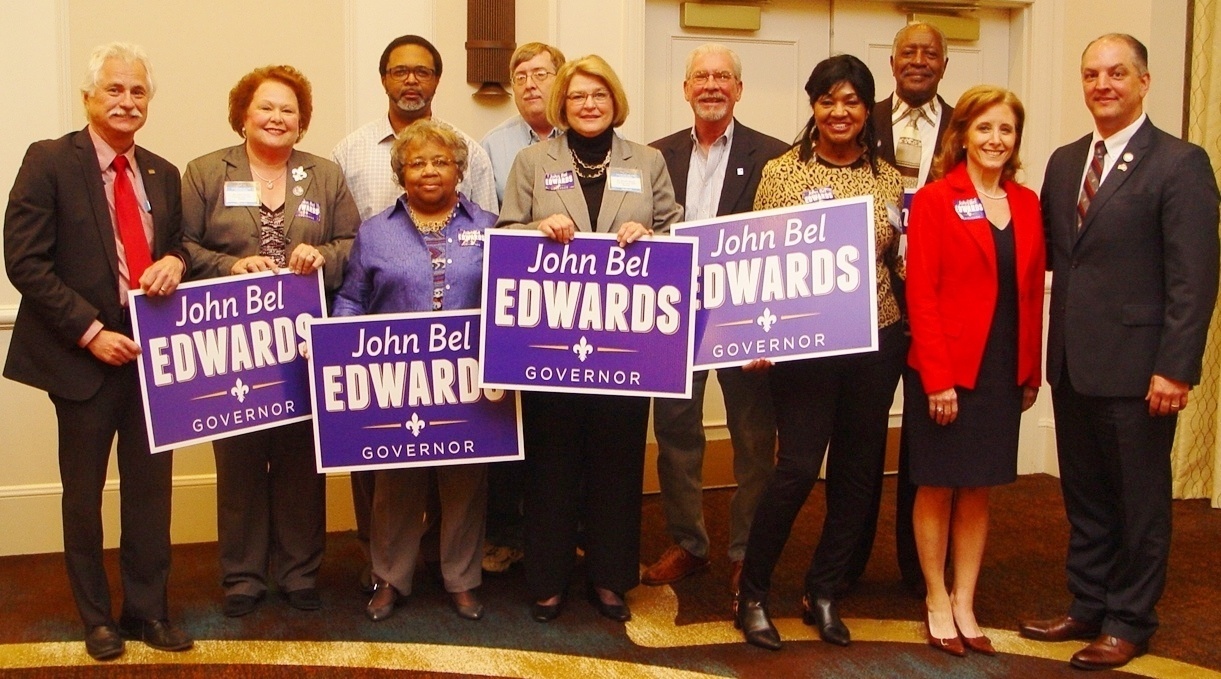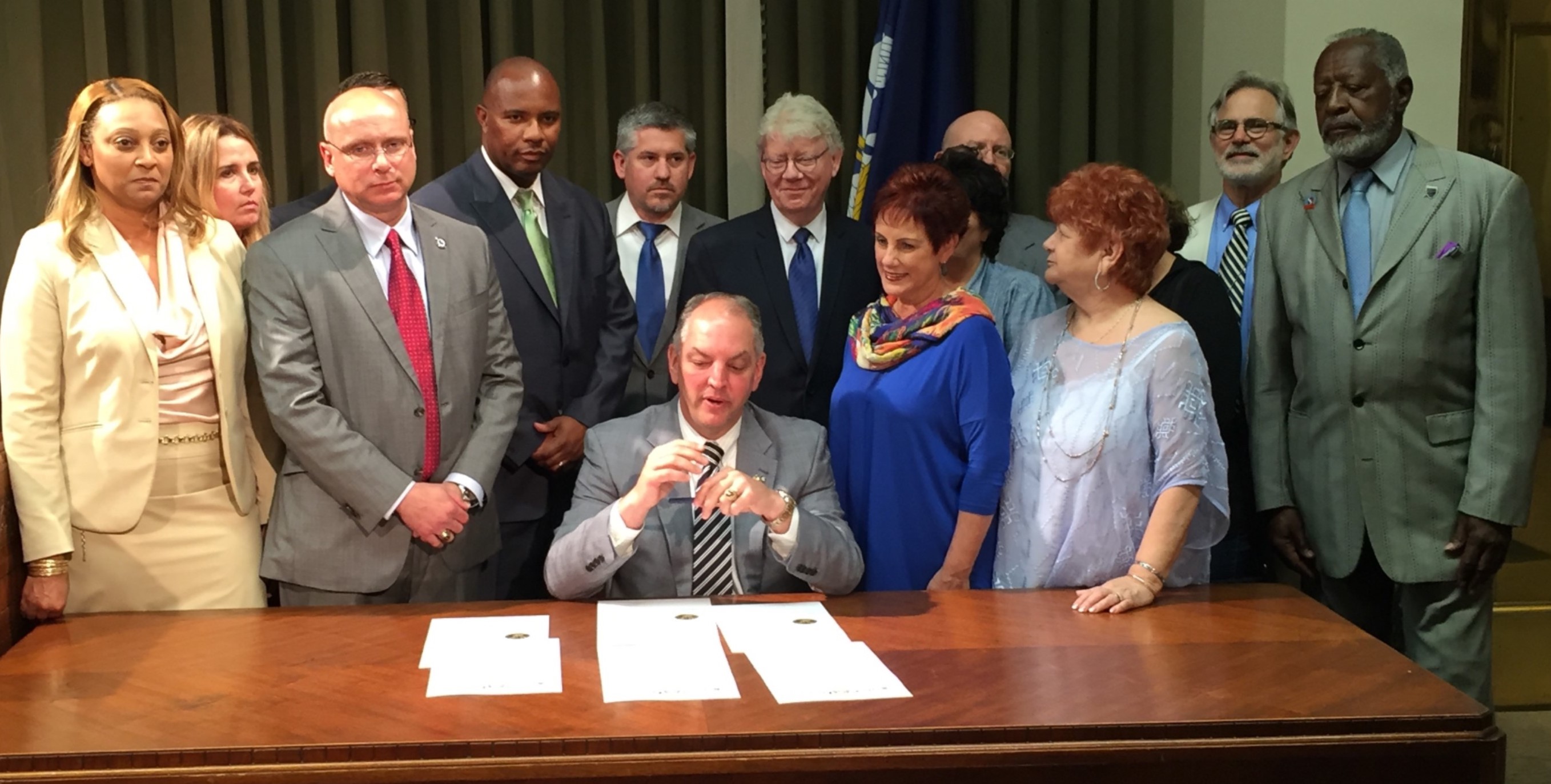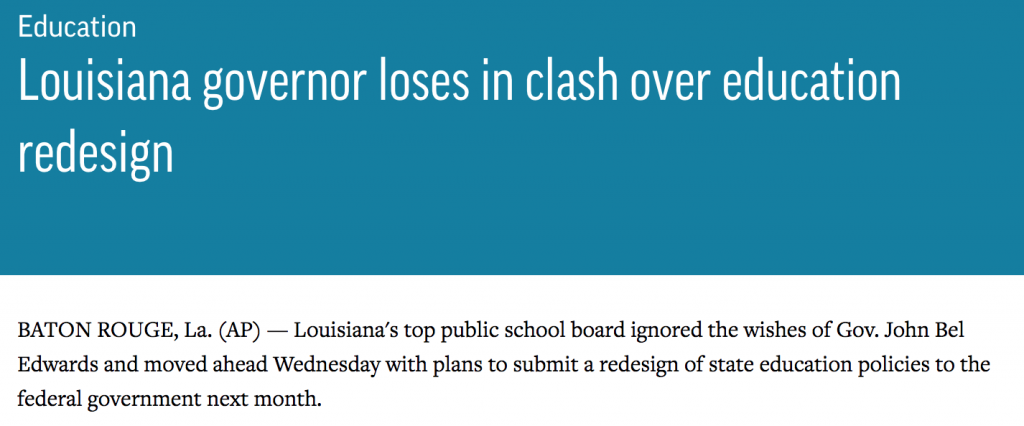“The definition of insanity is doing the same thing over and over again and expecting different results.”
I would venture to guess that most people are familiar with this aphorism, which is usually (although inaccurately) attributed to Albert Einstein. I say “most people” because the behavior of Governor John Bel Edwards suggests that he hasn’t absorbed this bit of wisdom. In fact, the line almost perfectly describes his repeated efforts to roll back the state’s education reform policies, including his recent failed attempt to block State Superintendent John White’s plan to comply with the Every Student Succeeds Act (ESSA).
During his tenure in the legislature, Edwards filed education bills – against charters, accountability, Common Core, etc. – that almost always died in committee. The cycle would repeat itself again the following year when he submitted nearly identical legislation.

As a candidate for governor, he allied himself with the teachers unions, railed against school grades, and promised to replace State Superintendent White if elected. To his credit, Edwards eventually did pull off a stunning upset, defeating Senator David Vitter in a runoff and becoming the first Democrat elected to statewide office in seven years. Yet those same elections returned a sizable pro-reform majority to the Board of Elementary and Secondary Education (BESE), meaning his promises to pare back accountability and boot John White were dead on arrival.
At that point, one might have expected that Edwards would see the writing on the wall and quietly drop his anti-education reform crusade. Although voters backed Edwards over Vitter, the outcome of the BESE races made clear they had no interest in reversing Louisiana’s school reforms. Plus, the newly-elected Governor had far more pressing matters to address, including a yawning $750 million budget deficit that his predecessor’s short-sighted fiscal policies had created.
More Unforced Errors on Education
Of course, that didn’t stop Governor Edwards from continuing to squander political capital on his education battles. When he unveiled his legislative agenda last spring, the education proposals in it read like a teachers union wishlist. Nearly all of them were rejected by state lawmakers.
Edwards then issued an executive order establishing the Advisory Council on the Every Student Succeeds Act, tasked with developing recommendations on how the state should revise its education policies to align with new federal law.

The move left observers scratching their heads for several reasons. First, the Governor has very little say over K-12 education policy (that power is vested in BESE and the Legislature) and State Superintendent John White already had a timeline in place for gathering public input and developing Louisiana’s ESSA plan. Second, Edwards packed the council with individuals who were affiliated with (or in bed with) the teachers unions, which called the legitimacy of the entire undertaking into question. And finally, because council members were known education reform opponents, their recommendations would almost certainly conflict with those of White, setting the stage for an eventual showdown between Edwards and the State Superintendent of Education.
At the time, I wrote a post urging the Governor to avoid “a prolonged and unpleasant fight over the state’s ESSA plan” that he was unlikely to win. He didn’t. His advisory council issued recommendations that were at odds with White’s proposal. The disagreement was then used as a pretext to call for a five-month delay in the plan’s submission to the feds. Edwards joined that call in a letter last week, in which he described White’s ESSA proposal as “an incomplete vision for Louisiana” and told the State Superintendent to rework it and send it to the U.S. Department of Education in September.
Nevertheless, on Wednesday, BESE voted 7-4 to submit White’s plan in April as intended. The Associated Press responded with the headline: “Louisiana governor loses in clash over education redesign.”

Where’s the political calculus?
There’s a fine line between between persistence and obstinacy, and when one considers the potential political costs involved in the Governor’s repeated efforts to roll back the state’s reforms, it’s clear that John Bel Edwards has crossed it.
I say this because, in most other respects, Edwards has done an admirable job as Governor (and has the approval ratings to back it up), especially considering the challenges he has faced. He entered office at a time when Louisiana was facing a fiscal crisis and has been willing to make difficult decisions to get the state’s balance sheet in order. With the exception of education issues, Edwards has largely stuck with his promise to lead from the center and has rightly drawn praise for his responses to the shooting tragedies in Baton Rouge and last summer’s disastrous floods.
Still, his political future is anything but certain. Edwards is the only Democratic governor in the Deep South and that fact alone makes him a target. Earlier this month, America Rising, a D.C.-based political action committee that conducts opposition research on Democratic incumbents, launched a media campaign against Edwards even though he isn’t up for reelection until 2019. On their website, America Rising portrays Edwards as a “big government liberal,” who “protects teachers unions.”

So when Edwards publicly sides with the teachers unions and tries to roll back school reform policies, he’s simply making the job of his political opponents that much easier. At the same, he’s also alienating the pro-reform Democrats, moderate Republicans, and independents he will need to get reelected. It just doesn’t make sense.
Let’s hope that Governor Edwards soon realizes that his fight against education reform is a lose-lose situation: Bad for kids and bad for his political career.


Great my friend how are you?
I think you’re misreading his efforts – he is publicly using these photo ops and political set pieces to show an important interest group that he supports them, but he knows perfectly well that his efforts will amount to nothing because he’s basically powerless in that arena. It’s a show to keep teachers unions on his side. He knows urban ed reformers will vote for him anyway because they’re mostly democrats, but he needs to convince teachers unions that he’s with them to keep them in line. I think it’s a shrewd move.
Here is the problem with your argument: Your point about urban ed reformers is probably correct – most of them are Democrats and many would still vote for him – but the same could be said for the teachers unions. LAE and LFT will back his reelection campaign, regardless of what he does. I also question how important the teachers unions really are in the grand scheme of things. I would venture to guess that LAE and LFT have no more than 10,000 active members combined and the unions do not have a level of influence over their members to guarantee that they can deliver most of those votes to Edwards.
In any case, as I noted in the piece, Edwards does not need the votes of urban ed reformers (although ed reformers could bring money to his campaign) and the teachers unions to get reelected as much as he needs the votes of moderate Republicans and independents. These political photo ops and set pieces cut both ways – yes, they make the teachers unions feel good, but they also make him look like he is in the pocket of labor and let conservatives paint him as a Northeast liberal. Given that Louisiana is a deep red state, it seems to me that he is focusing on the wrong constituency.
Finally, there is political capital and power of perceptions. Edwards has weakened his position vis-a-vis the legislature by suffering a very public defeat on the eve of the legislative session. Every time Edwards throws down the gauntlet on these education issues – and loses – it leaves him weaker politically.
I see your point and I agree that it probably does cut both ways. But I think he has less to lose than to win. Keep in mind who the main constituency of the anti-common core movement is: moderate repubs and independents. He’s picking his fights in ways that pay lip service to those concerns without actually having to take any action. I think (and his election showed) that the political divide in Louisiana is now less “big labor” + Northeast liberals vs. Southern Conservatives than urban vs. not urban. He’s got the urban vote by virtue of being a democrat, and he’s going out of his way now to appeal to the not urbans – who are worried that “liberals” are forcing “common core” and “reforms” on their schools. In that realignment, standing with teachers unions puts him in the camp that wants to keep things as they are. Just look at that picture of him surrounded by teachers union officials you posted. Do they look like “Northeast liberals”? No. That’s exactly the constituency that he needs to be worried about losing, and I think he’s found a way to keep them happy without doing anything.
Except that his battles since becoming governor have not been about Common Core – the Common Core fight is over and has been for more than two years at this point. (Plus, the main constituency of the anti-Common Core movement was not moderate Republicans and independents – it was, ironically, teachers union supporters and Tea Party Republicans. Some of the biggest supporters of CCSS were mainstream Republicans in the legislature.) His recent battles have been about accountability and charter schools, and on those topics, I would say moderate Republicans and independents are mostly in favor.
It would be hard maintain that politics in Louisiana was ever “big labor” + Northeast liberals vs. Southern Conservatives for the very fact that neither big labor nor Northeast liberals ever existed in this state. It is also hard to make the case that the divide is now urban vs. rural based on the outcome of the 2015 elections. If you look at the gubernatorial election map (http://bit.ly/2015govelection), Edwards carried far more rural parishes than urban ones.
Plus, to make the case that he is appealing to rural voters worried that liberals are forcing common core and reforms on their schools, you would have to explain away how those same rural areas of the state returned a overwhelmingly pro-reform BESE board (7/8 seats: http://bit.ly/2015bese) in the 2015 elections.
Finally, your assertion that standing with teachers unions puts him in the camp that wants to keep things as they are does not really make sense, since reformers have been in the drivers seat policy-wise for almost 20 years at this point. Statewide standardized testing was introduced in Louisiana in 1999. Kathleen Blanco took over NOLA public schools in 2005. Jindal backed tenure reform, accountability, and the expansion of charters. At every step of the way, Republicans in the legislature have supported these reform initiatives.
In your words, his recent actions “make him look like he is in the pocket of labor and let conservatives paint him as a Northeast liberal.” That’s the only reason those two terms came up in the first place. Personally, I don’t think very many Louisianans think of their local teachers as northeast liberals. And the fact that he won rural districts is precisely my argument – he is playing to those voters to win their votes. Everything he is doing now was foreshadowed by what he said in his campaign.
Republicans have long been pro school reform when it comes to charters and vouchers, and the current BESE board is no different. They’ve been broadly successful in adopting policies that primarily affect urban areas and leave suburban and rural districts largely untouched. Check out this map of Louisiana charter schools to see where the biggest effects have been. I think these changes have done a world of good, but I also think its premature to chalk them up to a coalition of ed reformers from across the state ready to shake up schools everywhere. They’re happy to shake up schools in New Orleans and BR and give individuals more power to make choices, but try closing a school that serves middle-income rural or suburban kids and see what happens.
The common core debate is a case in point. Far from being over, almost every BESE candidate publicized their stance, which was almost universally negative. They (or their constituents) might be in favor of reforms that primarily affect other people’s children or give individuals more choice (charters and vouchers), but when it comes to changes that affect them too, they balk. Sure, reformers have been in the driving seat policy-wise for a long time, but their focus has been on places like New Orleans and BR (as your examples suggest – and that doesn’t mean that those places were not in urgent need of reform). The fact is that education is one of those rare issues that’s not split exactly on party lines. It’s one of the few places politicians can cross ideological lines and not get crushed for it.
I guess it’s yet to be seen, but I think Louisiana’s (and other southern states’) teachers unions are set to establish themselves as the preservers of “traditional” education. I think there are quite a few voters out there who tend to vote republican and like that. I have a feeling Edwards thinks the same way. Interested to see how it turns out though!
Again, Louisianans don’t have to think of their local teachers as northeast liberals – they’re not running for office. However, John Bel Edwards will be, so that’s why conservative opponents of his are (and will) try to portray him that way.
Although you’re right that Republicans have supported charters and vouchers, you’re conveniently ignoring the accountability piece – a pretty big issue that touches every single public school in this state. You said, “They’ve been broadly successful in adopting policies that primarily affect urban areas and leave suburban and rural districts largely untouched.” That statement is hard to square with BESE’s approval of John White’s ESSA plan just this past week which had nothing to do with charters or vouchers and everything to do with accountability.
Is it premature to chalk up the reforms we’ve seen in Louisiana to a coalition of ed reformers from across the state ready to shake up schools everywhere? LABI, CABL, Stand for Children, Democrats for Education Reform, Louisiana Federation of Children, Urban League – all of these groups work closely with each other to press forward statewide reform initiatives, not just charter schools, and that sure looks like a coalition to me.
I don’t understand your point about Common Core, because I don’t think anyone would claim that the fight is still going on at all. And, your claim that every BESE candidate opposed Common Core flies in the face of the evidence. The seven pro-reform members of the board have been on the record as supporting Common Core. We HAVE Common Core right now as our state standards, although the name was changed and some minor, mostly cosmetic adjustments were made. Holly Boffy, BESE Vice President, was a big supporter of Common Core who represents one of the “hotbeds” of anti-CCSS opposition (Calcasieu), who nevertheless was reelected. The thing with the CCSS fight was that opponents did a good job (initially) of creating the illusion that they had more support than they really ever did. Keep in mind, there were literally DOZENS of bills filed to get rid of CCSS at the height of the battle – all of them were defeated.
Also, if you think that reformers have only been focusing on places like New Orleans and BR, then you haven’t been paying close attention. Yes, charter schools in NOLA or BR (especially NOLA) might draw national headlines, but reformers have been working on accountability, teacher tenure reform, teacher evaluations, raising graduation standards, overhauling teacher training, increasing college and career readiness, and expanding AP access, among other things. These are issues that impact every school and district in the state.
Finally, I do agree that education is one of those rare issues that’s not split exactly on party lines – and that’s exactly why Edwards needs to find common ground with reformers instead of fighting them because he needs support from voters on both sides of the aisle. And it isn’t yet to be seen whether teachers unions – in Louisiana, the South, or United States – are set to establish themselves as the preservers of “traditional” education. They already have – that’s why they oppose reforms all across the country.
I think you will discover that the ESSA plan will not be submitted until Sept. Always White’s intent.
Do I need to send you the articles which describe the same thing? They’re linked in the piece – explore them.
Thank you.
Seriously, I apologize. I know you haven’t been disrespectful towards me. We can agree to disagree w/o animosity. My bad.
Losing streak. Hmm. Do you consider Jindal’s ed policies a ‘winning streak?’ I think winner/loser thinking in ed policy is unfortunate.
Previous tweet deleted, you’re right – my response was unkind. I apologize.
Good article and analysis, how have you been?